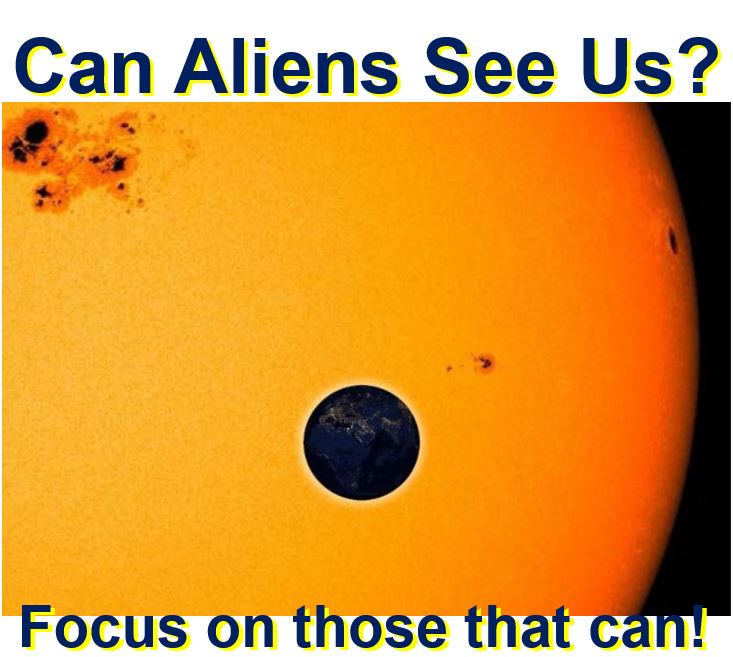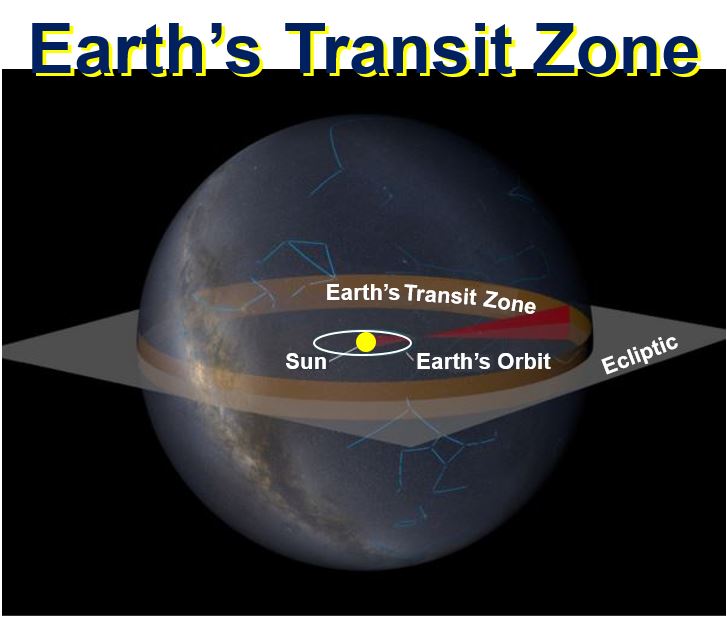Alien seekers must make sure they – if any exist – can see us, otherwise sending out all these messages into space and searching vast areas of the Universe could be a huge waste of precious resources, says a team of scientists. We could be missing loads of signals from space, and they could be missing ours.
A predator does not want to be seen by its prey – the element of surprise is crucial for a successful kill. That is not what alien hunters are doing. They want their ‘prey’ to see them – the sooner the better!
If you want to contact alien civilisations, wouldn’t it be better to first focus on those planets and parts of the Universe that can see us? We want to filter out places which are less likely to see us, says René Heller, an astronomer at the Max Planck Institute for Solar System Research in Göttingen, Germany, and Ralph Pudritz, an astronomer at McMaster University in Hamilton, Canada.
 When the Earth moves in front of the Sun, part of its light is blocked. Alien observers outside our Solar System might be able to see the Sun’s dimming and study Earth’s atmosphere. This transit method helped us find most of the 2,000 expolanets we know of today. We should focus on parts of space that can see Earth blocking the Sun. (Image: mpg.de. Credit: NASA/Axel Quetz)
When the Earth moves in front of the Sun, part of its light is blocked. Alien observers outside our Solar System might be able to see the Sun’s dimming and study Earth’s atmosphere. This transit method helped us find most of the 2,000 expolanets we know of today. We should focus on parts of space that can see Earth blocking the Sun. (Image: mpg.de. Credit: NASA/Axel Quetz)
What if we miss their signals?
The two scientists wrote in the scientific journal Astrobiology that we need to make sure we do not miss the signal if alien observers try to contact us first.
Heller and Pudritz argue that our best chance of detecting a signal from intelligent extraterrestrials is to presume they are using similar methods to search for us that we are using in our quest to find life out there.
Space researchers here on Earth are focusing most of their resources on moons, planets and celestial objects that are too distant to see us directly. Instead, they should be studied by tracking their shadows as they pass in front of their own host stars (their own suns).
By measuring the dimming of a star’s light as a planet crosses in front of it, researchers can gather a wealth of information, without ever having seen those world’s directly.
 An artist’s depiction of Earth’s transit zone, in which faraway observers could see our planet pass in front of the Sun. (Image: mpg.de. Credit: NASA/Axel Quetz)
An artist’s depiction of Earth’s transit zone, in which faraway observers could see our planet pass in front of the Sun. (Image: mpg.de. Credit: NASA/Axel Quetz)
By using methods that allow us to estimate the average stellar illumination and temperatures on their surfaces, we have managed to identify several locations in our Universe where life as we know it could potentially exist.
Focus on the ‘transit zone’
Pudritz and Heller wonder whether we are looking at all this the wrong way round. What if alien observers discover our planet as it transits the Sun?
If such extraterrestrial observers are using similar search methods to our own, the two scientists propose that we should turn our collective ear to Earth’s ‘transit zone’ – the tiny slice of space from which Earth’s passage in front of the Sun can be detected.
Heller said:
“It’s impossible to predict whether extraterrestrials use the same observational techniques as we do.”
“But they will have to deal with the same physical principles as we do, and Earth’s solar transits are an obvious method to detect us.”
Within the transit zone, there are about 100,000 potential targets, each with their own planets or moons that might have the necessary requirements for life to exist, the scientists say. That number is just for the targets we are currently aware of with our current radio telescope technologies.
 Blue = Yes. Red = No. Grey = Don’t know. If you believe aliens exist, you are not alone – over half of Britons, Americans and Germans do so too, according to a YouGov survey carried out last year.
Blue = Yes. Red = No. Grey = Don’t know. If you believe aliens exist, you are not alone – over half of Britons, Americans and Germans do so too, according to a YouGov survey carried out last year.
Pudritz and Heller wrote:
“If any of these planets host intelligent observers, they could have identified Earth as a habitable, even as a living world long ago and we could be receiving their broadcasts today.”
Dr. Heller is a post-doctoral fellow who, while at McMaster, worked with Prof. Pudritz, a professor of Physics and Astronomy. Dr. Heller is now at the Institute for Astrophysics in Göttingen, Germany.
The question of contact with possible extraterrestrial civilisations beyond Earth is hardly hypothetical, as a number of projects are under way, both to send signals from our planet and to search for signals that have been sent directly or have ‘leaked’ around obstacles, possibly travelling for several thousands of years.
Pudritz and Heller propose that the Breakthrough Listen Initiative, part of the most comprehensive search for alien life ever conducted, can maximize its chances of success by focusing its search on Earth’s transit zone.
Citation (not yet online): “The Search for Extraterrestrial Intelligence in Earth’s Solar Transit Zone,” Heller, R. & Pudritz, R. E. Astrobiology, Volume 16, Issue 4. 1 March, 2016. http://dx.doi.org/10.1089/ast.2015.1358 (2016).
Video – Are we alone in the Universe?
Are there aliens out there, or are we the only ones? That is a question humans have wondered about ever since time immemorial.

